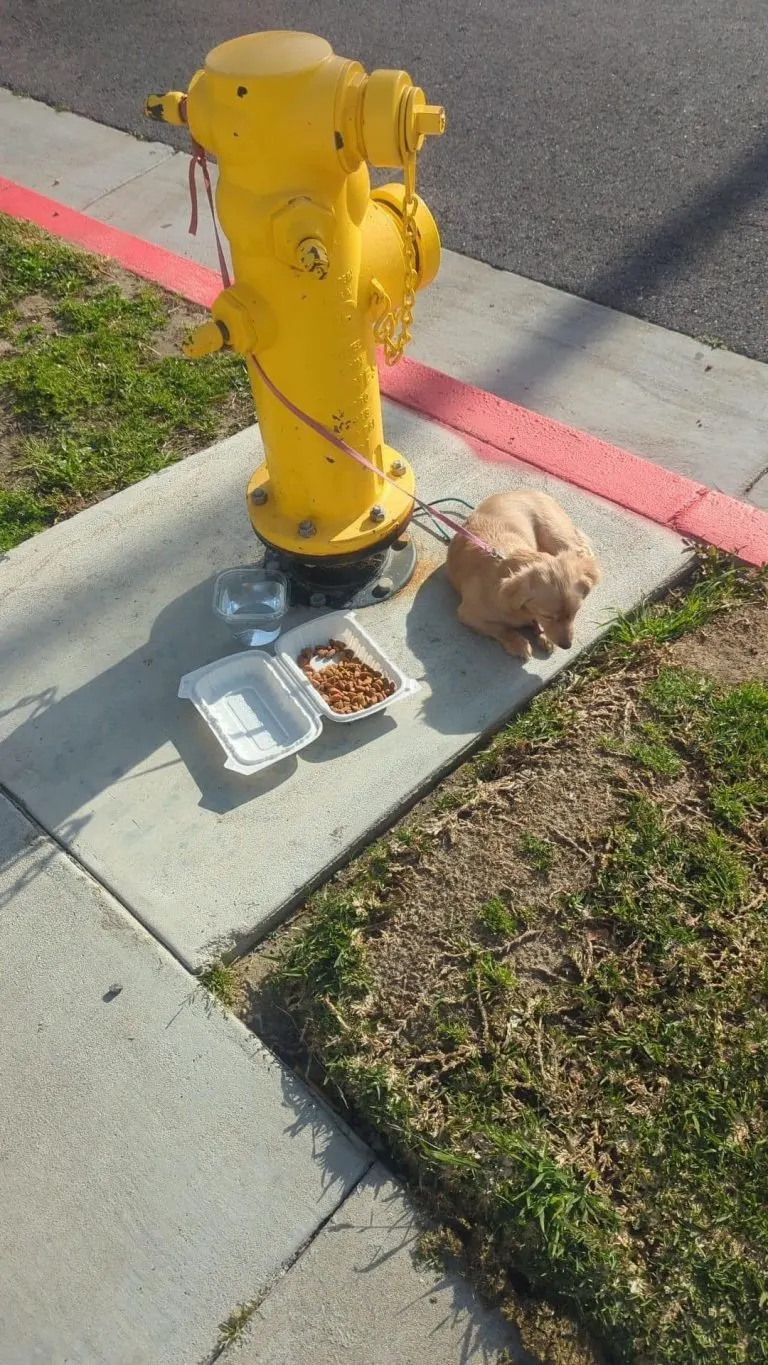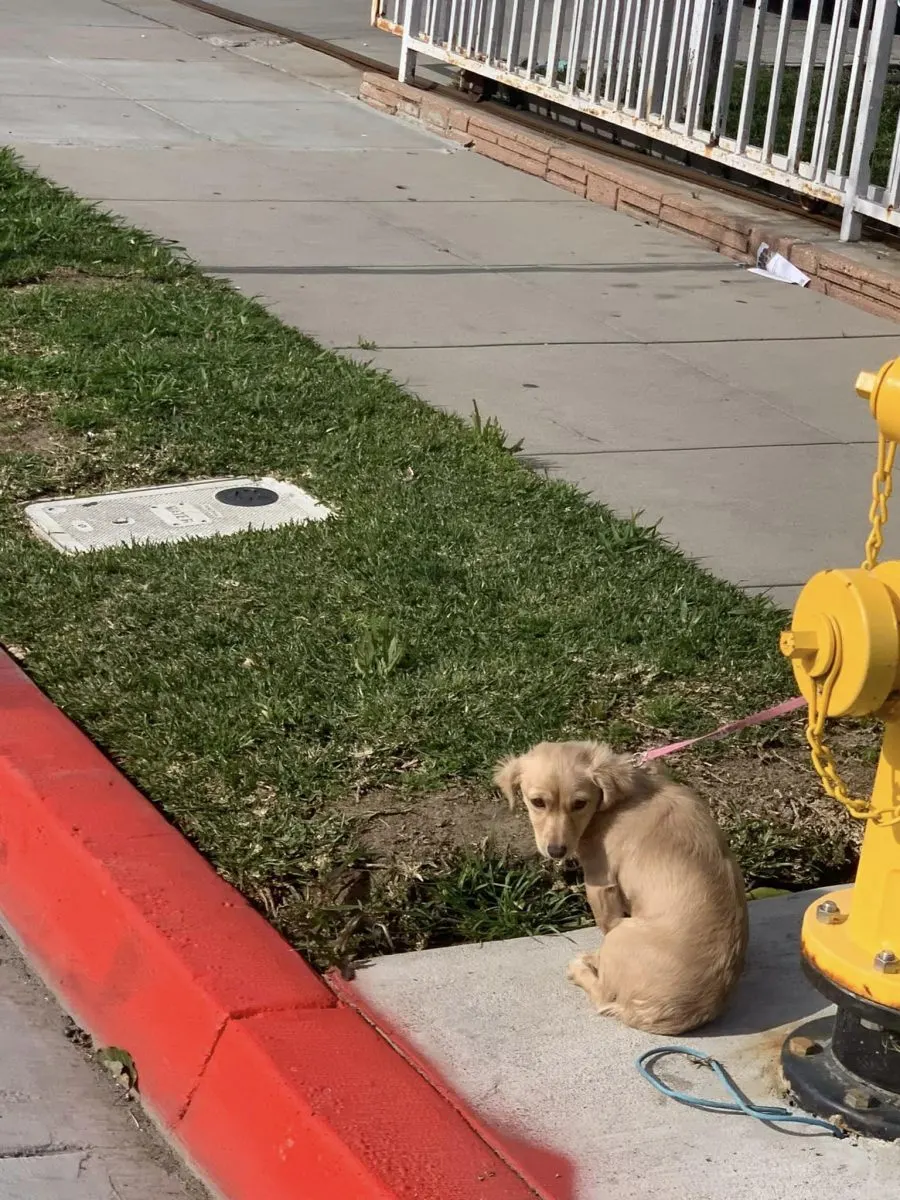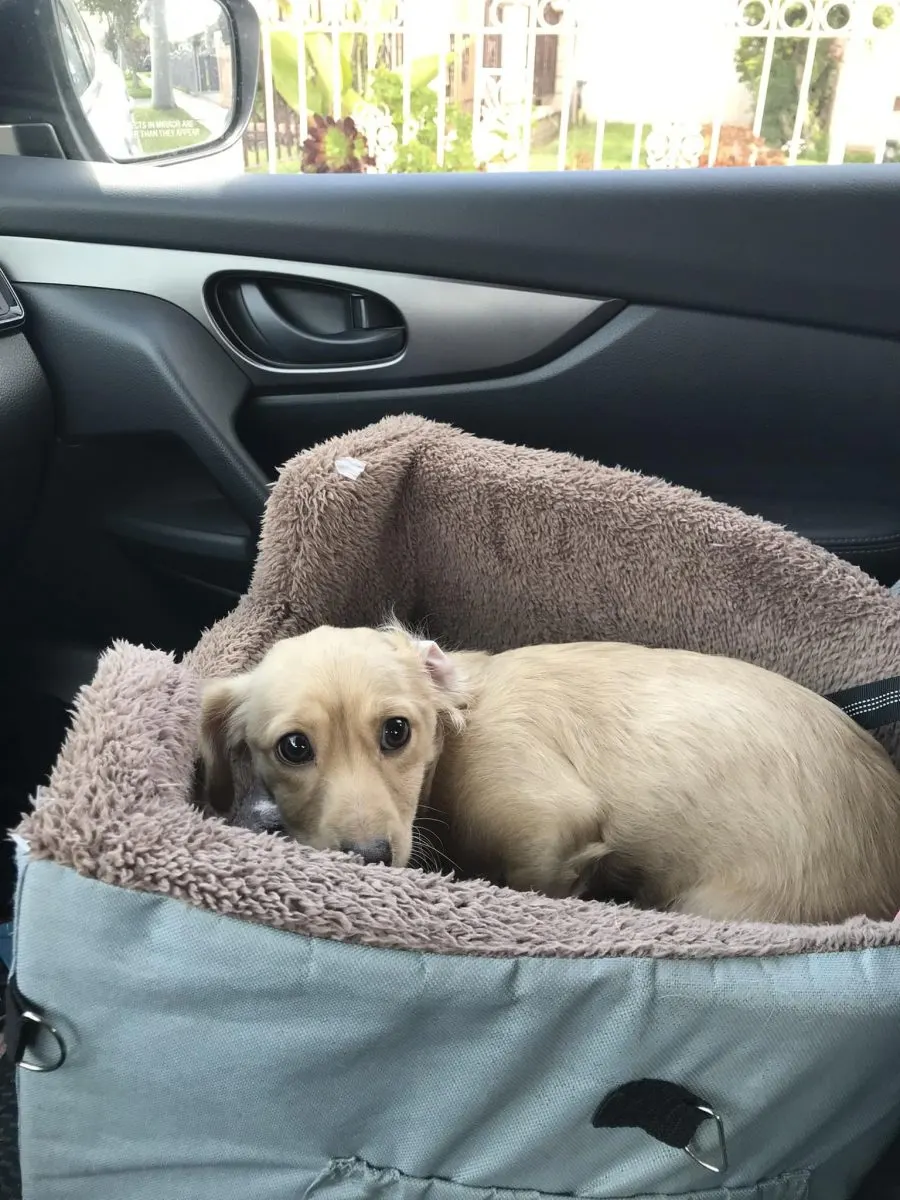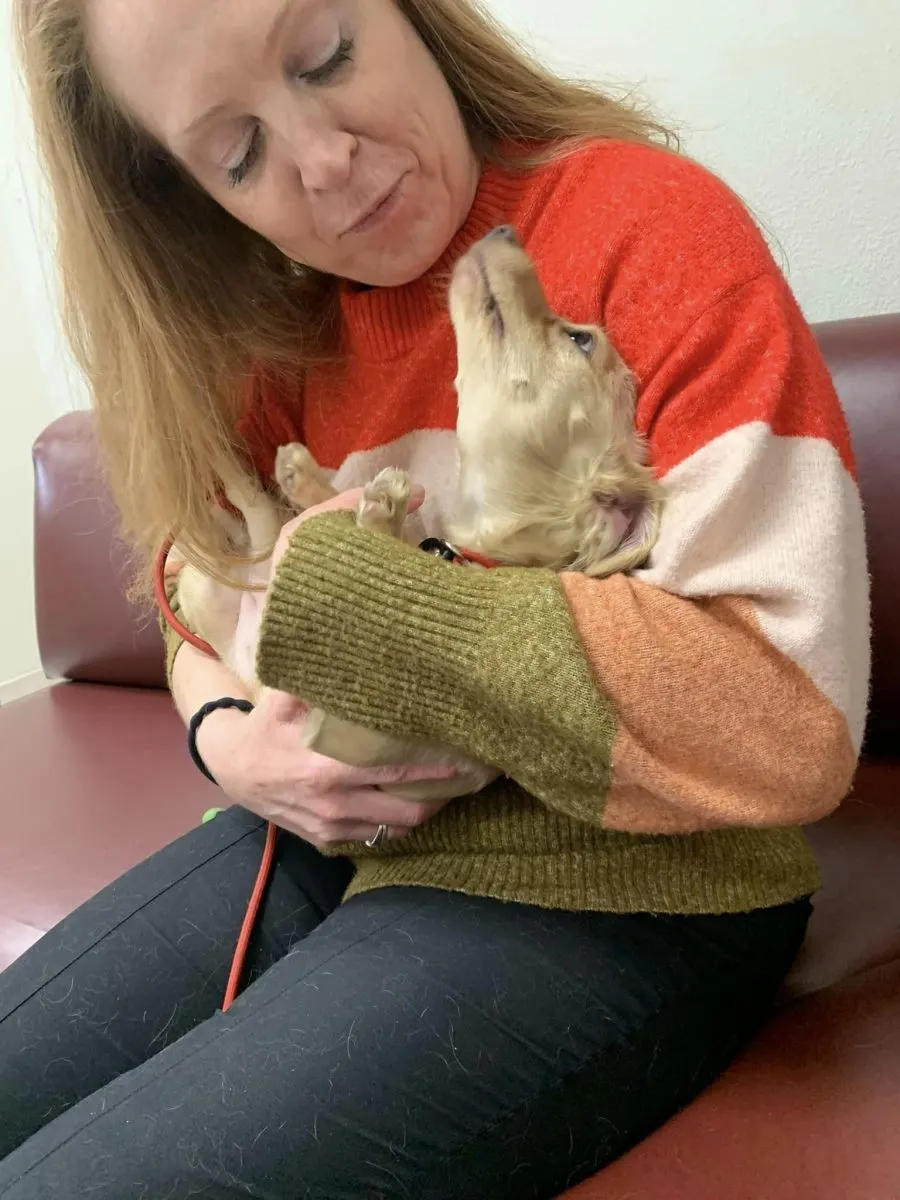Owning a pet is a great responsibility. Unfortunately, people who leave their four-legged buddies on the streets are not aware of the pain these little creatures go through.
Cici, a doggie that was found tied to a fire hydrant, was so heartbroken that she couldn’t even eat or drink the food that was placed next to her.
Her owners meant the world to her, and now her world was shattered.
Furry Curl Of Sadness

A cream Doxie puppy was found on the streets of Southern California with dog food and water that were left untouched.
An anonymous person reached Suzette Hall, who is the owner of Logan’s Legacy rescue, and she was more than ready to save this poor pooch. However, she was far away from the address.
But, Suzette remembered a person she knew from the neighborhood who immediately came to save Cici.

As expected, the dog showed resistance and wasn’t willing to cooperate with the stranger, probably because she was still waiting hopelessly for her owners to come back and pick her up.
The saddest part of the story is that Cici curled herself up into a tight ball, with her head down on the pavement and a look that would break the heart of every dog lover in the world.
The Stranger Who Wouldn’t Give Up
Instead of leaving Cici at the same spot until Suzette arrived, the neighbor persisted in her intention of saving the doggo.
Cici’s leash was all wrapped up around the hydrant so she could barely even move, but she still didn’t trust the stranger enough to let her help.
But, the neighbor didn’t give up. Instead, she was on the phone with Hall all the time, who advised her as to how to approach Cici.
As soon as Cici was freed from the hydrant, the woman took her into her car and went straight to the vet.

Although the dog wasn’t in perfect shape while she was tied up, Hall and the woman didn’t expect her condition to become worse in such a short time, as Hall told The Dodo:
“She got so sick in the car […] We think it was from fear and lack of food and water since she was too scared to eat the food they’d left.”
Fortunately, it didn’t take long for her to get better at the pet hospital and finally start showing her true personality.

She’s All About Huggies And Kisses
During the hospital stay, Cici found her favorite hooman whom she loved so much that she couldn’t stop kissing her all the time.
Hedy Herold, the office manager from the hospital, spent all the time she could with Cici after noticing how happy the pup would get as soon as she saw her.
Hall even shared a video of the adorable interaction between Hedy and Cici:
According to the news from Suzette Hall’s Facebook Page, Cici was supposed to be fostered until they found the perfect forever home, but in the end, her foster parents decided to adopt her.
A person named Rose Rosie, on Facebook, wrote a comment under Hall’s post about Cici, saying:
“I only meant to foster this sweet girl. After a few min of meeting her, I knew I was getting another family member. It was love at first hug. I love you, CiCi, and you are forever safe with our little family.”

I believe you are just as happy to hear such great news as I am! I also hope that Cici will finally get to live the life she deserves.
If you’ve ever shared a bed with a furry friend, you know that dogs can sometimes sound like tiny chainsaws in their sleep. It’s a common occurrence that can be both amusing and puzzling. The symphony of snorts and wheezes coming from your canine companion might leave you wondering, “Why do dogs snore?”
As a seasoned dog trainer, you’ve likely encountered this phenomenon during your late-night cuddle sessions with your four-legged trainees. Understanding the reasons behind why dogs snore can provide insights into their health, sleeping habits, and overall well-being. So, let’s take a closer look at the adorable yet noisy world of canine snoring.
Understanding Dog Snoring: The Basics
What Is Snoring and How Does It Happen in Dogs?
Snoring is the noisy breathing dogs make while asleep. It occurs when air flows past relaxed tissues in the throat, causing them to vibrate. Just like in humans, snoring in dogs is a common occurrence during sleep and can vary in intensity.
- Obesity: Extra weight can lead to increased tissue around the throat, resulting in airway obstruction and snoring.
- Sleeping Position: Dogs that sleep on their backs are more prone to snoring due to the position of their soft palate.
- Allergies: Similar to humans, dogs can have allergies that cause nasal congestion, leading to snoring.
- Brachycephalic Breeds: Dogs with short noses and flat faces, like Bulldogs and Pugs, are more susceptible to snoring due to their anatomy.
- Age: As dogs age, their muscles can lose tone, increasing the likelihood of snoring.
- Medical Conditions: Issues such as respiratory infections, dental problems, or nasal blockages can also contribute to snoring in dogs.
Understanding why dogs snore can help you identify underlying issues and ensure your furry friend’s well-being. If you notice excessive snoring or other concerning symptoms, it’s best to consult your veterinarian for proper evaluation and guidance.
Breeds and Snoring Patterns
Dog Breeds That Are More Likely to Snore
Certain dog breeds are prone to snoring due to their anatomy. Breeds with short noses, like Bulldogs, Pugs, and French Bulldogs, are more likely to snore than others. Their short nasal passages can obstruct airflow during sleep, causing snoring sounds. If you have one of these breeds, don’t be surprised if you hear some nighttime rumblings from your furry friend.
Brachycephalic Dogs and Their Snoring Quirks
Brachycephalic breeds, such as Boxers, Shih Tzus, and Boston Terriers, have unique snoring quirks. Because of their short skulls and compressed airways, these dogs often struggle to breathe normally, leading to snoring. Their snoring can vary in intensity and may worsen with age. If you have a brachycephalic dog, their snoring habits are likely a normal part of their breathing patterns.
Health Concerns Related to Dog Snoring
When Snoring May Indicate a Health Problem
If your dog’s snoring suddenly becomes louder or more frequent, it could indicate an underlying health issue. Keep an eye out for signs like gasping for air during sleep, trouble breathing when awake, or excessive daytime sleepiness. These could point to problems like sleep apnea, obesity, or upper airway obstructions that require veterinary attention.
The Connection Between Obesity and Snoring in Dogs
Similar to humans, obesity in dogs can contribute to snoring. Excess weight can lead to soft tissue in the throat and neck region, which can obstruct the airway during sleep, causing snoring. If your furry friend is carrying some extra pounds and snoring loudly, it might be time to consult your vet about implementing a healthy diet and exercise plan to help them shed the weight and improve their breathing.
How to Reduce Snoring in Your Dog
Lifestyle Changes for Your Snoring Canine Companion
If your dog snores, there are simple lifestyle modifications you can make to help reduce the noise. One effective way is to adjust your dog’s sleeping position. Elevating their head slightly while they sleep can promote better air passage, thus minimizing snoring. Additionally, ensuring your furry friend maintains a healthy weight through proper diet and exercise can significantly reduce snoring.
When to Consult a Vet About Your Dog’s Snoring
While occasional snoring is normal for dogs, persistent or loud snoring could indicate an underlying health issue. If you notice a sudden change in the frequency or intensity of your dog’s snoring, it’s essential to consult a vet. This is especially crucial if your dog shows other symptoms like pauses in breathing during sleep, excessive daytime sleepiness, or coughing. A vet can evaluate your dog’s overall health and provide guidance on managing any potential health concerns related to snoring.
Conclusion
So, there you have it – dogs snore for various reasons, from obesity to breed characteristics and medical conditions. Understanding why your furry friend snores is crucial for their well-being. Remember, certain breeds are more prone to snoring due to their anatomy. Making simple lifestyle changes, like adjusting their sleep position and keeping them at a healthy weight, can help reduce their snoring. If your dog’s snoring persists or gets louder, it’s best to consult a vet. Look out for other symptoms like breathing pauses, excessive sleepiness, or coughing, as they could signal underlying health issues. Prioritize your pup’s health and happiness by staying informed and taking action when needed.
Frequently Asked Questions
Why do dogs snore?
Dogs snore due to various reasons like obesity, sleeping position, allergies, breed characteristics, age, and medical conditions. Understanding these causes is crucial for identifying potential health issues.
Which dog breeds are prone to snoring?
Certain dog breeds are more prone to snoring due to their anatomical features. Brachycephalic breeds like Bulldogs, Pugs, and Boston Terriers are known to snore more frequently.
How can I reduce my dog’s snoring?
You can reduce your dog’s snoring by making lifestyle changes such as adjusting their sleeping position and maintaining a healthy weight through proper diet and regular exercise.
When should I consult a vet about my dog’s snoring?
It is advisable to consult a vet if your dog’s snoring becomes persistent or loud, especially if accompanied by other symptoms like pauses in breathing, excessive daytime sleepiness, or coughing, to address potential underlying health issues.
[no_toc]

Hey there, I’m Janet Brooks, a dog-loving student from California. I’m all about helping pups in need, especially those without homes. Me and my awesome friends work together to give shelter and love to stray dogs. Oh, and I also write blogs about dogs to share helpful info.